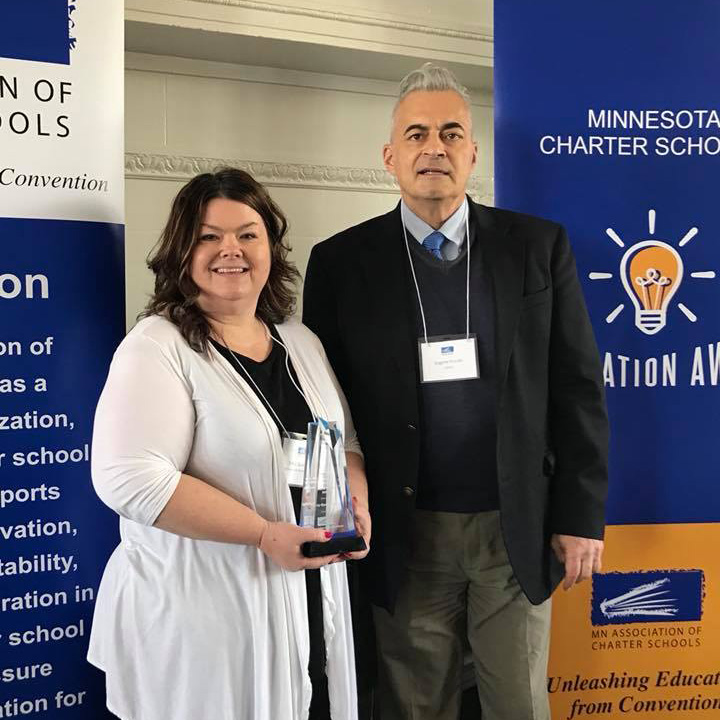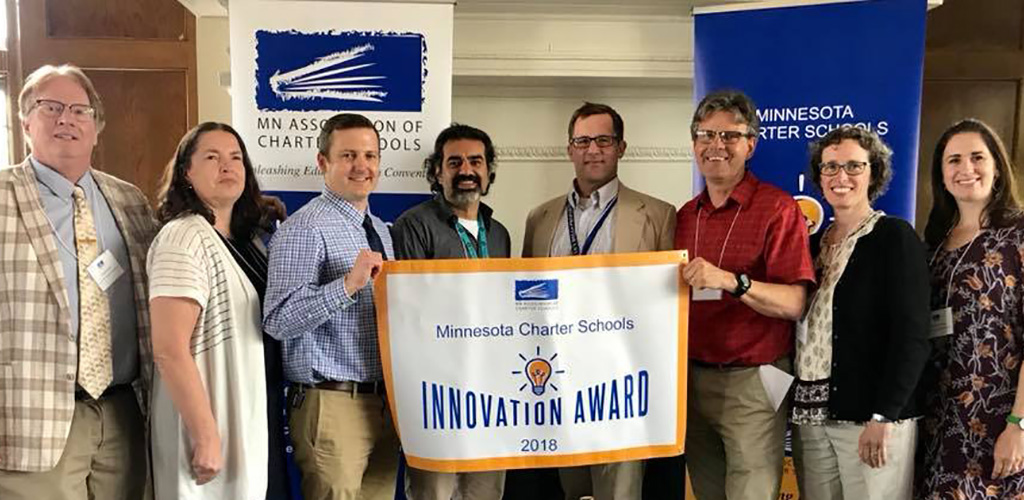On May 10, the Minnesota Association of Charter Schools recognized four schools at the third annual Innovation Awards event. Additionally, under a new award program established this year, one educator was honored with the Minnesota Charter School Leadership Award.
Innovation Awards categories are derived from Minnesota statute (124E.01), which defines the purposes of charter schools in the state:
- Increase Learning Opportunities for Students
- Encourage the Use of Different & Innovative Teaching Methods
- Different & Innovative Forms of Measuring Outcomes
- Create Professional Opportunities for Teachers
Increase Learning Opportunities for Students
Seven Hills Preparatory Academy (SHPA), a K-8 school in Bloomington, understands the relationship of social-emotional learning to student success. Still, SHPA has struggled to find a budget for things like a full-time student counselor—a common dilemma for schools across the state.
In partnership with Adler Graduate School, they developed a model wherein graduate interns provide counseling services in four areas: guidance curriculum, individual planning, responsive services, and system support. This field experience prepares interns for licensure while meeting student need for counseling. Since 2013, the partnership has grown, demonstrating that cost-effective counseling can be a reality for charter school students and families.
Encourage the Use of Different & Innovative Teaching Methods
When the Academy for Sciences and Agriculture, a Vadnais Heights middle and high school, relocated in 2017, staff determined it was the right time to also rethink the learning environment.
They arrived at an open-space physical school design that enables more hands-on experiences for students, who participate in mixed-grade level learning groups centered on their unique interests and needs. This flexibility empowers students to take ownership of their learning within an interdisciplinary school curriculum.
Different & Innovative Forms of Measuring Outcomes
Face to Face Academy, a 9-12 high school in Saint Paul, serves an often over-aged and under-credited student population. Face to Face strives to hold themselves accountable for making (and tracking) progress on meeting the needs of their students. But they found traditional graduation rate measures did not accurately capture progress for their student population.
They saw that attendance was a reliable predictor of graduation (of students with an attendance rate of at least 80%, all graduated), and so developed a replicable graduation rate on-track measure to inform the way they support students—placing emphasis on engagement to improve attendance and increase the number of students earning a diploma from the school.
Create Professional Opportunities for Teachers
Prairie Creek Community School, a K-5 elementary school in Northfield, tackles professional development by emphasizing teacher autonomy. Teacher-led, weekly professional development sessions cover interdisciplinary teaching, authentic assessment, social justice, literacy—topics relevant to their ongoing work with students.
In their professional development culture, teachers are encouraged to take risks. They do so with the support of their colleagues—who they see as always there to answer questions and offer support, but also to challenge them.
Innovation Award winners receive $1,000 and a video highlighting their innovation. The award for a fifth purpose of charters, “to establish new forms of accountability for schools,” did not receive applications this year.
Charter School Leadership Award
The new Minnesota Charter School Leadership Award honored Tracy Quarnstrom from TRIO Wolf Creek Distance Learning Center. Quarnstrom founded TRIO 16 years ago and has served as its Executive Director ever since.

In addition to her award, Quarnstrom received $500 and her leadership will be documented in a video produced by MACS.
Innovation Awards applications will be available November 1, and can be submitted from January 2, 2019 until the January 31 deadline. The Minnesota Charter School Leadership Award nomination period opens January 7, 2019, with a deadline of February 28. Check the Minnesota Association of Charter Schools website for more information.
Found this useful? Sign up to receive Education Evolving blog posts by email.
